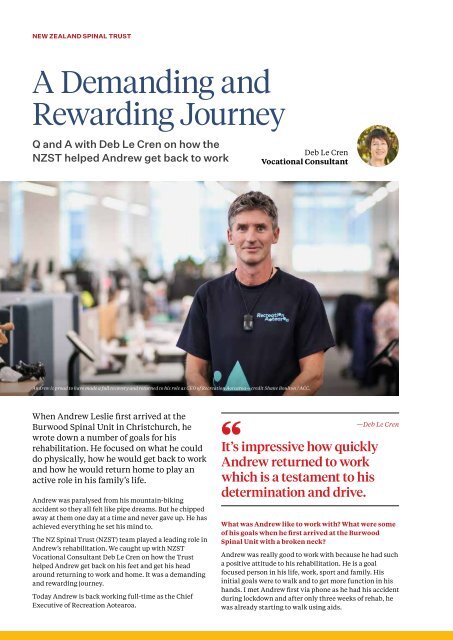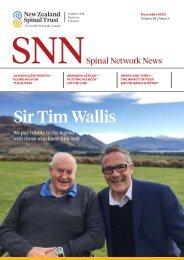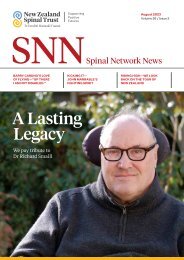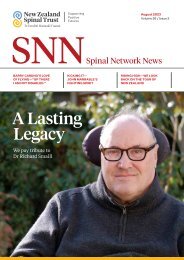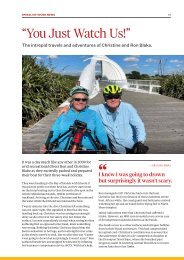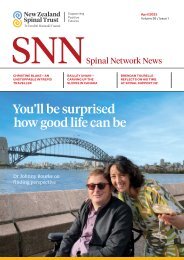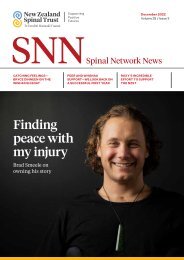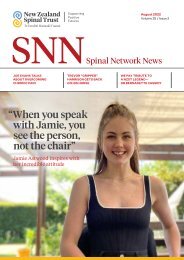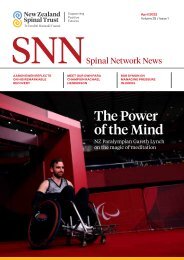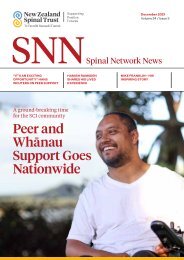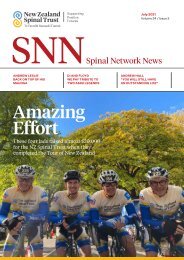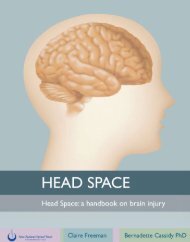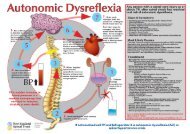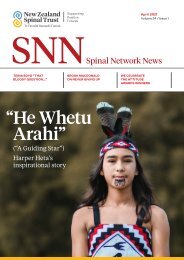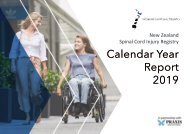SNN_Story_A Demanding and Rewarding Journey
Create successful ePaper yourself
Turn your PDF publications into a flip-book with our unique Google optimized e-Paper software.
NEW ZEALAND SPINAL TRUST<br />
A <strong>Dem<strong>and</strong>ing</strong> <strong>and</strong><br />
<strong>Rewarding</strong> <strong>Journey</strong><br />
Q <strong>and</strong> A with Deb Le Cren on how the<br />
NZST helped Andrew get back to work<br />
Deb Le Cren<br />
Vocational Consultant<br />
Andrew is proud to have made a full recovery <strong>and</strong> returned to his role as CEO of Recreation Aotearoa—credit Shane Boulton / ACC.<br />
When Andrew Leslie first arrived at the<br />
Burwood Spinal Unit in Christchurch, he<br />
wrote down a number of goals for his<br />
rehabilitation. He focused on what he could<br />
do physically, how he would get back to work<br />
<strong>and</strong> how he would return home to play an<br />
active role in his family’s life.<br />
Andrew was paralysed from his mountain-biking<br />
accident so they all felt like pipe dreams. But he chipped<br />
away at them one day at a time <strong>and</strong> never gave up. He has<br />
achieved everything he set his mind to.<br />
The NZ Spinal Trust (NZST) team played a leading role in<br />
Andrew’s rehabilitation. We caught up with NZST<br />
Vocational Consultant Deb Le Cren on how the Trust<br />
helped Andrew get back on his feet <strong>and</strong> get his head<br />
around returning to work <strong>and</strong> home. It was a dem<strong>and</strong>ing<br />
<strong>and</strong> rewarding journey.<br />
Today Andrew is back working full-time as the Chief<br />
Executive of Recreation Aotearoa.<br />
—Deb Le Cren<br />
It’s impressive how quickly<br />
Andrew returned to work<br />
which is a testament to his<br />
determination <strong>and</strong> drive.<br />
What was Andrew like to work with? What were some<br />
of his goals when he first arrived at the Burwood<br />
Spinal Unit with a broken neck?<br />
Andrew was really good to work with because he had such<br />
a positive attitude to his rehabilitation. He is a goal<br />
focused person in his life, work, sport <strong>and</strong> family. His<br />
initial goals were to walk <strong>and</strong> to get more function in his<br />
h<strong>and</strong>s. I met Andrew first via phone as he had his accident<br />
during lockdown <strong>and</strong> after only three weeks of rehab, he<br />
was already starting to walk using aids.
SPINAL NETWORK NEWS<br />
How has the NZ Spinal Trust supported Andrew in his<br />
rehabilitation?<br />
The Trust provided Andrew with a range of support along<br />
his journey. For me specifically in vocational<br />
rehabilitation, we supported him by being there for<br />
regular discussions with him about his return-to-work<br />
goals <strong>and</strong> supporting his thinking.<br />
During his recovery, how big was his motivation to get<br />
back to work?<br />
It was massive. Andrew was always focused on returning<br />
to work <strong>and</strong> he was in regular contact with his team<br />
during his inpatient stay. The support offered through the<br />
vocational service was to provide a sounding board for<br />
him to talk through his return-to-work ideas <strong>and</strong> to assist<br />
him with creating a timetable so he could begin doing<br />
some work during his stay in Transitional Rehab (TR). We<br />
also discussed managing his energy levels, taking heed of<br />
fatigue <strong>and</strong> adopting a flexible attitude to move work to<br />
another part of the day or week to compensate if needed.<br />
Andrew talked through the set-up in his home office,<br />
using voice-activated software <strong>and</strong> the ongoing support<br />
that ACC can provide with return-to-work planning.<br />
Andrew’s success is not the case for everyone, why<br />
was he so successful in his rehab?<br />
It’s impressive how quickly Andrew returned to work<br />
which is a testament to his determination <strong>and</strong> drive <strong>and</strong><br />
possibly also his sense of responsibility to his team <strong>and</strong><br />
more importantly, his family.<br />
Andrew commented that: “Being back at home is very<br />
different than being in the hospital <strong>and</strong> highlights how<br />
valuable TR is <strong>and</strong> the advice/support from Deb Le Cren<br />
<strong>and</strong> the Spinal Trust. It requires a lot of self-motivation<br />
<strong>and</strong> organisation to continue to progress recovery from<br />
the injury <strong>and</strong> return to a normal life, including work. I<br />
have self-motivation, but it would be difficult for those<br />
that don’t”.<br />
We are proud that we have been able to make a difference<br />
in his recovery <strong>and</strong> it was awesome to see Andrew back to<br />
work <strong>and</strong> living independently less than one year after his<br />
accident.<br />
How does returning to work help an individual from a<br />
mindset point of view?<br />
Getting back to work is usually important for people’s<br />
self-esteem, independence <strong>and</strong> part of their returning to<br />
life as ‘normal’. For those not on ACC funding, getting<br />
back to work is often a financial imperative.<br />
What advice do you offer to others who have sustained<br />
an SCI <strong>and</strong> are looking at getting back into work?<br />
It’s useful for people who are looking to get back into the<br />
workforce to get support from a vocational consultant<br />
who can help them identify their transferrable skills,<br />
values <strong>and</strong> motivators before they start to look for work<br />
<strong>and</strong> also review their CV <strong>and</strong> give them coaching in<br />
interview skills <strong>and</strong> job search. It is scary at first but<br />
talking to someone can really help <strong>and</strong> the benefits of<br />
getting back into the workforce <strong>and</strong> being independent<br />
once again are huge for the person <strong>and</strong> their family.<br />
Andrew says it was scary being told by the doctors that he was a tetraplegic.<br />
“It’s never too late to be what you<br />
might have been.” George Elliot.<br />
The guiding principles for the NZST’s Vocational<br />
Rehabilitation Service are:<br />
• Everyone can have a great job<br />
• It’s healthy to be working<br />
• The sooner the better<br />
• There are thous<strong>and</strong>s of work opportunities<br />
• Personal networks are the key<br />
• The process for getting a job is the same as before<br />
• You can do it yourself – whatever it takes!<br />
• Your life experiences give you unique qualifications<br />
What is Vocational Rehabilitation?<br />
The vocational rehabilitation programme is an early<br />
intervention <strong>and</strong> restorative vocational rehabilitation<br />
program that provides detailed career advice <strong>and</strong><br />
planning, educational support <strong>and</strong> works to reduce the fear<br />
of work <strong>and</strong> remove barriers. The vocational rehab team<br />
are dedicated to getting people who have a spinal cord<br />
injury or acquired illness into meaningful <strong>and</strong> sustainable<br />
employment. Services delivered are specialist work<br />
support, both to acute patients <strong>and</strong> community clients.<br />
The NZ Spinal Trust’s specialist vocational rehabilitation<br />
programme is based at the Burwood <strong>and</strong> Auckl<strong>and</strong><br />
Spinal units <strong>and</strong> also provides services at Middlemore<br />
Hospital.<br />
For more information visit<br />
https://www.nzspinaltrust.org.nz/new-to-sci/<br />
vocational-rehabilitation-service/


